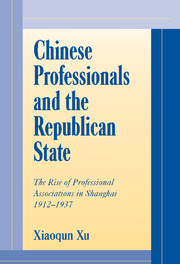 Chinese Professionals and the Republican State
Chinese Professionals and the Republican State Published online by Cambridge University Press: 07 September 2009
THE Shanghai Bar Association was a professional organization sanctioned by the Republican government from the beginning, and thus a legally established association (fatuan) or public association (gongtuan). The status of professional association was essential for the legitimacy of the organization, especially during the Nanjing Decade, as the government strictly regulated social associations and relentlessly suppressed real or perceived subversive organizations in society. The Shanghai Bar Association did start out for professional purposes, as shown in Chapter 8. Since the Regulations on Lawyers of 1912 and 1927 prohibited bar associations from undertaking matters beyond judicial affairs, the Shanghai Bar's activities mostly aimed at the professionalization of lawyers, the recovery of the nation's judicial rights, and the establishment of the rule of law and judicial independence in the country. Yet, if professionalization per se was an apolitical goal, the demand for the rule of law and judicial independence often challenged the practices of the authorities and thus assumed political meanings. Furthermore, if the demand for the rule of law and judicial independence could be defended as judicial issues and therefore professional concerns for lawyers, the same could not be said of the actions directed at national politics and the government's foreign policies.
To save this book to your Kindle, first ensure no-reply@cambridge.org is added to your Approved Personal Document E-mail List under your Personal Document Settings on the Manage Your Content and Devices page of your Amazon account. Then enter the ‘name’ part of your Kindle email address below. Find out more about saving to your Kindle.
Note you can select to save to either the @free.kindle.com or @kindle.com variations. ‘@free.kindle.com’ emails are free but can only be saved to your device when it is connected to wi-fi. ‘@kindle.com’ emails can be delivered even when you are not connected to wi-fi, but note that service fees apply.
Find out more about the Kindle Personal Document Service.
To save content items to your account, please confirm that you agree to abide by our usage policies. If this is the first time you use this feature, you will be asked to authorise Cambridge Core to connect with your account. Find out more about saving content to Dropbox.
To save content items to your account, please confirm that you agree to abide by our usage policies. If this is the first time you use this feature, you will be asked to authorise Cambridge Core to connect with your account. Find out more about saving content to Google Drive.